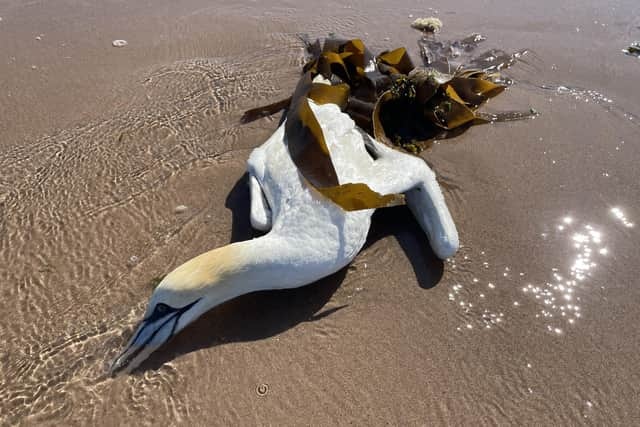Government urged to act over rising numbers of seabird deaths linked to avian flu
and live on Freeview channel 276
Urgent calls have been made for a response plan to the thousands of dead seabirds found on Scotland’s coastline.
Highly Pathogenic Avian Influenza has swept through colonies, affecting various species.
Advertisement
Hide AdAdvertisement
Hide AdIt is estimated that more than 1,000 gannets and many hundreds of great skuas have been found dead so far, according to reports.


Staff monitoring the world’s largest colony of Northern gannets on the Bass Rock off the East Lothian coast fear it could be the next to be seriously affected.
Remote colonies around the Scottish coastline have been littered with dead and dying seabirds and other waterfowl in increasing numbers.
Scotland has 60% of the world’s population of breeding great skuas and 46% of breeding gannets with hundreds of both species reported dead already.
Advertisement
Hide AdAdvertisement
Hide AdRSPB Scotland has urged the Scottish Government and NatureScot to ensure measures are put in place to reduce any further threat.


Other species affected include sandwich and Arctic terns, with reports of high mortality at a colony on the Mull of Galloway where a number of dead guillemots have also been found.
Colonies of birds in Shetland, Fair Isle, Orkney, the Western Isles, Handa, the Flannan Isles, St Kilda, and Troup Head have all been affected.
Restrictions were put in place in Shetland last week following a confirmed outbreak of bird flu in a commercial flock.
Advertisement
Hide AdAdvertisement
Hide AdAnd East Lothian Council this week issued health advice to anyone coming across a stricken or dead bird on its shores.
It followed dozens of wild birds dying in a suspected avian flu outbreak at Loch Fleet, near Golspie in Sutherland, last month.
Stewart Bain, of the RSPB, urged anyone who sees sick or dead birds toto report them, adding: “This will help give a clearer picture of the situation and inform how it is dealt with.”
Mr Bain said members of the public should take extra care to not disturb nesting birds to help protect numbers that appear to be decreasing fast.
Advertisement
Hide AdAdvertisement
Hide AdLast winter HPAI devastated numbers of barnacle geese in the Solway, between Cumbria and Wigtownshire, with estimates of a loss of more than a third of the world’s Svalbard population, according to RSPB.
Dead gannets have been found daily on the East Lothian coast since the start of this month – often in groups of ten or more which are “inevitably” linked to Bass Rock. The number of deaths have been described as “significantly higher” than what would usually be expected.
On Wednesday experts from the Department for Environment, Food and Rural Affairs (Defra) took a number of the seabirds found on the Bass Rock and beaches around North Berwick to test them for H5N1 subtype of avian influenza.
The Scottish Seabird Centre based in North Berwick is in discussion with other organisations about the possibility of a drone survey with some other organisations.
Advertisement
Hide AdAdvertisement
Hide AdChief executive, Susan Davies, also called for a wild bird response group to help coordinate the reaction to the outbreak to protect the 140,000 gannets and other birds on the Bass Rock.
She said: “We cannot predict what kind of fatality that would be. It is a watch and wait game that we are in.”
Comment Guidelines
National World encourages reader discussion on our stories. User feedback, insights and back-and-forth exchanges add a rich layer of context to reporting. Please review our Community Guidelines before commenting.